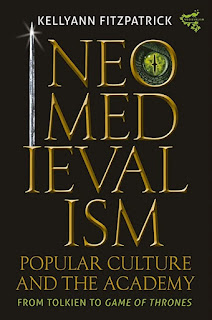Memory and Medievalism in George RR Martin and Game of Thrones: The Keeper of All Our Memories
Carolyne Larrington (Anthology Editor), Anna Czarnowus (Anthology Editor)
Full details on ordering information can be found on the publisher's website at this link.
Product details
Published Sep 08 2022
Format Hardback
Edition 1st
Extent 240
ISBN 9781350269590
Imprint Bloomsbury Academic
Illustrations 12 bw illus
Dimensions 9 x 6 inches
Publisher Bloomsbury Publishing
Description
This book explores the connections between history and fantasy in George RR Martin's immensely popular book series 'A Song of Ice and Fire' and the international TV sensation HBO TV's Game of Thrones. Acknowledging the final season's foregrounding of the cultural centrality of history, truth and memory in the confrontation between Bran and the Night King, the volume takes full account of the TV show's conclusion in its multiple readings across from medieval history, its institutions and practices, as depicted in the books to the show's own particular medievalism. The topics under discussion include the treatment of the historical phenomena of chivalry, tournaments, dreams, models of education, and the supernatural, and the different ways in which these are mediated in Martin's books and the TV show. The collection also includes a new study of one of Martin's key sources, Maurice Druon's Les Rois Maudits, in-depth explorations of major characters in their medieval contexts, and provocative reflections on the show's controversial handling of gender and power politics.
Written by an international team of medieval scholars, historians, literary and cultural experts, bringing their own unique perspectives to the multiple societies, belief-systems and customs of the 'Game of Thrones' universe, Memory and Medievalism in George RR Martin and Game of Thrones offers original and sparky insights into the world-building of books and show.
Table of Contents
Introduction
Part I – Memory
1. On Medieval Dream Tradition in George R. R. Martin's A Song of Ice and Fire
Bartlomiej Blaszkiewicz (University of Warsaw, Poland)
2. The Medievalist Emotional Economy in George R. R. Martin's A Song of Ice and Fire
Anna Czarnowus (University of Silesia, Poland)
Part II – Reimagining History
3. George R.R. Martin's A Song of Ice and Fire and Maurice Druon's Les Rois Maudits (The Accursed Kings)
Carolyne Larrington (University of Oxford, UK)
4. Broken Bodies, Broken Kingdoms, Broken Promises: The Revolutionary Failure of A Game of Thrones
Robert Rouse (University of British Columbia, Canada) and Cory Rushton (St Francis Xavier University, Canada)
Part III – Faith and Salvation
5. The Dog, the Cynic, and the Saint: The Case of Sandor Clegane
Thomas Honegger (Friedrich-Schiller-Universität Jena, Germany)
6. The Figure of George R.R. Martin's Septon Meribald and the Franciscan Legacy
Maria Blaszkiewicz University of Warsaw, Poland)
Part IV – Key Institutions
7. The Citadel and the Ivory Tower: Academia and Education in Westeros
Mikayla Hunter (University of Oxford, UK)
8. The Iron Bank Will Have Its Due: Trade and Economics in Game of Thrones
Caroline Batten (University of Oxford, UK)
Part V – Chivalry: Theory and Practice
9. The Warrior(s) in Crisis: The Knights of Westeros and the Process of Civilization
Anja Müller (Siegen University, Germany)
10. Tournaments and Judicial Duels in George R.R. Martin's The World of Ice & Fire and A Song of Ice and Fire
Przemyslaw Grabowski-Górniak (Independent Scholar, Poland)
Part VI - The HBO Effect: Violence and Misogyny
11. From Romance to Rape: The Portrayal of Masculine Sexuality in Game of Thrones
Kristina Hildebrand (Halmstad University, Sweden)
12. The Case of Cersei Lannister: Neomedievalist Misogyny in George R.R. Martin's A Song of Ice and Fire
Sylwia Borowska-Szerszun (University of Bialystok, Poland)
Index


